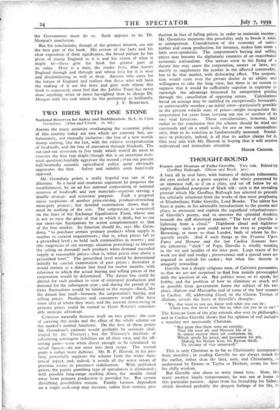TWO BIRDS WITH ONE STONE
National Reserves for Safety and Stabilisation. By L. St. Clare Grondona. (Allen and Unwin. 7s. 6d.)
AMONG the many anxieties overhanging the economic policy of this country today are two which are contrary but, un- fortunately, not mutually exclusive : the fear of a new world- slump starting, like the last, with the relative overproduction of foodstuffs, and the fear of starvation through blockade. The out-and-out reversion to free trade which would do most to exorcize the first fear might (though this is an uncertain tech- nical question) fearfully aggravate the second ; even our present half-heartedly autarkic agricultural policy quite obviously
aggravates the first. Safety and stability seem hopeessly opposed.
Mr. Grondona points a really hopeful way out of the dilemma. In a lucid and moderate argument he proposes the establishment, by an ad hoc national corporationg of national reserves of foodstuffs and raw materials—reserves serving a double strategic and economic purpose. Such a proposal raises suspicions of another price-raising, produce-restricting monopoly project ; but detailed examination shows that it need be nothing of the sort. The corporation is conceived on the lines of the Exchange Equalisation Fund, whose aim is not to raise the price of that in which it deals, but to cut out short-run fluctuations by action complementary to that of the free market. Its function should be, says Mr. Gron- dona, " to purchase certain primary products when supply is surplus to current requirements ; that is, when prices fall to a prescribed level ; to hold such commodities in reserve ; and (the exigencies of our strategic situation permitting) to liberate (by selling on demand) such products when demand exceeded supply at reasonable prices—that is, when prices rose above a prescribed level." The prescribed level would be determined initially by careful examination of past prices ; thereafter it would remain as a datum line fixed for twelve months, with reference to which the actual buying and selling prices of the corporation would be determined. The datum line could be altered for each product in view of estimated production and demand for the subsequent year ; and during the period of its fixity fluctuations would be limited to the margin—fixed, like the datum line itself—between the corporation's buying and selling prices. Producers and consumers would alike have some idea of where they were, and the current down-swing in primary prices could be turned to Great Britain's consider- able strategic advantage.
Criticism naturally focusses itself on two points : the cost of carrying the stocks and the effect of the whole scheme on the market's normal functions. On the first of these points Mr. Grondona's estimate would probably be seriously chal- lenged by the Treasury ; but the Treasury's methods of calculating contingent liabilities are all their own, and the off- setting gains—even when direct enough to be calculated in actual figures—do not enter into their scope. The second point is rather more dubious. Mr. R. F. Harrod, in his pre- face, powerfully supports the scheme from the wider theo- retical aspect, and, indeed, it avoids all the worst errors of previous essays in piecemeal stabilisation. With published prices, the purely gambling type of speculation is eliminated ; with possible long-range marking down, the secular trend away from primary production is provided for. But certain disturbing possibilities remain. Family farmers dependent on a single cash-crop may increase, rather than restrict, pro- duction in face of falling prices, in order to maintain income ; Mr. Grondona mentions this possibility only to brush it aside as unimportant. Consideration of the economy of native rubber and cocoa production, for instance, makes him seem a little over-optimistic. The corporation's buying and selling prices may become the diplomatic counters of an exacerbated economic nationalism. One serious error in the fixing of a datum line may cause the corporation, sooner or later, not merely to supplement the market in the affected commodity, but to be that market, with dislocating effect. The corpora- tion would score over the private dealer in its ability and willingness to take the long view, but there is no reason to suppose that it would be sufficiently superior in expertise to outweigh the advantage bestowed by competitive pricing
through the cancellation of opposing errors. Calculations based on acreage may be nullified by exceptionally favourable or unfavourable weather ; an initial error—particularly possible in the present volatile state of prices—might incapacitate the corporation for years from carrying out one or another of its two vital functions. - These considerations, however, lead rather to the conclusion that the scheme should be tried out cautiously and on a small scale, for one or two commodities only, than to its rejection as fundamentally unsound. Sound- ness in principle, indeed, is all that its author claims for it. One may join with Mr. Harrod in hoping that it will receive widespread and immediate attention.
HONOR CROOMR.










































 Previous page
Previous page